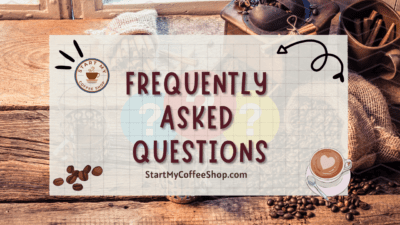Starting a coffee shop can be an exciting venture, but it’s crucial to have a clear understanding of the costs involved.
A start-up coffee shop’s costs may depend on various factors such as location, location, equipment, and size of the operation. Typically, you can expect to have a budget from $50,000 to $500,000.
In this article, I will explore the various aspects of starting a coffee shop and provide you with a cost breakdown to help you plan your startup budget effectively.
Location
Selecting the perfect location for your coffee shop is a critical decision that can significantly impact your business’s achievement. Several factors must be considered in this process. First and foremost, foot traffic plays a crucial role.
Choosing an area with high pedestrian flow increases the chances of attracting potential customers. However, keep in mind that these high-traffic locations often come with higher rental prices, which must be factored into your budget.

Accessibility is another key consideration. Look for a location that is easily reachable by both pedestrians and vehicles. A coffee shop situated near public transportation, office buildings, or residential areas can draw a diverse customer base and generate consistent revenue. Additionally, ensure that your chosen location offers sufficient parking spaces to accommodate your customers’ needs.
Competition is an essential aspect to evaluate. While some competition can be healthy and indicative of a viable market, too much can adversely affect your coffee shop’s profitability. Research the existing coffee shops in the vicinity and analyze their offerings, prices, and target audience. Differentiating your coffee shop through unique features, specialty brews, or a distinct atmosphere can help you stand out in a competitive landscape.
When scouting potential locations, you might encounter spaces that require renovations or leasehold improvements to suit your coffee shop’s needs. These modifications can include installing proper plumbing, electrical work, interior design changes, and ensuring compliance with health and safety regulations. It’s essential to account for these potential expenses in your initial budget planning.
Read more about: Opening a Coffee Shop Legal Requirements: The Legal Must-Haves
Equipment and Furnishings
Equipping your coffee shop with the right tools and furniture is a crucial aspect of your startup budget. To create a functional and appealing space, you’ll need a range of equipment and furnishings. These include essential items like espresso machines, coffee grinders, and brewing equipment, as well as refrigeration units and display cases to showcase your delectable offerings.
The quality and quantity of equipment required will depend on the size and scale of your operation, as well as the specific menu items you plan to offer. It’s important to strike a balance between affordability and durability. While it can be tempting to opt for lower-priced options, investing in high-quality equipment can save you money in the long run, as they tend to have better performance and require less maintenance.
When budgeting for equipment, consider both the upfront costs and the ongoing maintenance expenses. Factor in warranties, repairs, and replacements that may be necessary over time. It’s wise to research different suppliers, compare prices, and read customer reviews to ensure you’re making informed decisions.
Additionally, don’t overlook the importance of furnishing your coffee shop with comfortable seating arrangements and aesthetically pleasing decor. The ambiance and atmosphere you create can greatly enhance the overall customer experience, encouraging them to spend more time in your coffee shop and become loyal patrons.
Inventory
To offer a diverse and enticing menu to your customers, stocking a well-managed inventory is crucial. Your inventory will consist of various items such as coffee beans, milk, syrups, pastries, and disposable supplies like cups and lids. Accurately estimating your daily consumption is key to avoiding unnecessary wastage while ensuring you have sufficient stock to meet customer demands.
One way to manage inventory costs effectively is by establishing partnerships with reliable suppliers. Research and identify reputable suppliers who can provide you with high-quality products at competitive prices. Building strong relationships with suppliers can potentially lead to favorable pricing terms and discounts, helping you optimize your inventory expenses.
Negotiating contracts with suppliers can also be beneficial in managing costs. Long-term contracts or bulk purchasing agreements may allow you to secure better pricing or favorable payment terms. Additionally, closely monitoring inventory levels and implementing efficient inventory management systems can help prevent overstocking or understocking, minimizing wastage and maximizing profitability.
Regularly reviewing and analyzing sales data can provide valuable insights into consumer preferences and demand patterns. This information can guide your purchasing decisions, allowing you to adjust inventory levels accordingly. Utilizing inventory management software or systems can streamline these processes, ensuring you have a well-balanced inventory that meets customer needs while minimizing excess stock.
By accurately estimating your daily consumption, partnering with reliable suppliers, negotiating favorable contracts, and implementing efficient inventory management practices, you can effectively control your inventory costs. Striking the right balance between stocking enough products and avoiding unnecessary wastage will contribute to the overall profitability of your coffee shop.
Staffing

Staffing costs encompass wages, benefits, and possibly training expenses. When planning your budget, consider the number of employees needed to efficiently manage different areas of your coffee shop, including the front counter, barista station, kitchen (if applicable), and cleaning duties.
Hiring skilled baristas and customer service-oriented individuals ensures that your coffee shop delivers a high-quality experience to customers. Investing in the right people who are knowledgeable about coffee, friendly, and capable of providing exceptional service is essential for customer satisfaction and repeat business.
Factor in the costs of wages and benefits when determining your staffing budget. Research the average wages for positions in your area to ensure competitive compensation while being mindful of your overall financial constraints. Additionally, consider benefits such as health insurance, vacation time, and employee perks to attract and retain top talent.
Training expenses may arise, particularly if you have specific techniques or standards that you want your staff to follow. Providing proper training not only enhances the skills of your employees but also contributes to a consistent and outstanding customer experience.
Striking a balance between providing excellent service and managing labor costs is crucial. Carefully schedule shifts to meet customer demand without incurring unnecessary overtime expenses. Regularly assess staff performance and make adjustments as necessary to ensure optimal efficiency.
Read more about: Opening a Coffee Shop Cost: The Beans and the Budget
Licenses and Permits
To ensure the legality and compliance of your coffee shop, acquiring the necessary licenses and permits is a crucial step. The specific licenses and permits required may vary depending on your location and the services you offer. Common examples include health permits, food handling certifications, and liquor licenses if you plan to serve alcohol.
Researching the specific regulations and fees applicable to your jurisdiction is vital, as the requirements can vary significantly from one region to another. Contact the local health department, licensing agencies, or regulatory bodies to understand the specific permits needed for your coffee shop. They can provide you with the necessary information, application forms, and guidance to navigate the process.
Budgeting for these costs is essential. License and permit fees can vary in price, and it’s important to allocate funds accordingly. Consider the application process timeline and potential renewal fees for licenses that require periodic updates.
Additionally, allocate sufficient time for the application process, as it may involve submitting documentation, attending inspections, or completing training programs. Planning and allowing ample time for obtaining licenses and permits will help ensure a smooth and timely opening of your coffee shop.
By prioritizing compliance with legal requirements and allocating resources for licenses and permits, you can establish your coffee shop on solid legal ground. Operating within the boundaries of the law not only safeguards your business but also enhances your reputation among customers and instills trust in your brand.
Marketing and Branding
Start by creating a visually appealing logo that represents your coffee shop’s unique personality and values. A well-designed logo can make a lasting impression and serve as a visual representation of your brand. Additionally, developing a user-friendly website that showcases your menu, location, and ambiance can help potential customers find and learn more about your coffee shop.
In today’s digital age, leveraging social media platforms is crucial for effective marketing. Implement social media strategies by creating engaging content, sharing enticing images of your coffee offerings, and interacting with your online audience. Social media provides an excellent opportunity to build a community around your brand and attract potential customers.
Consider running promotional campaigns or offering special discounts to entice new customers and encourage repeat visits. Collaborate with local influencers or organize events to generate buzz and increase your coffee shop’s visibility.
If you’re unsure about designing logos, creating websites, or implementing marketing strategies, it’s worth considering hiring professionals such as graphic designers or marketing agencies. Their expertise can help you establish a strong brand presence in your target market and ensure that your marketing efforts yield the desired results.
Utilities and Overhead Expenses

Running a coffee shop comes with a range of ongoing expenses that need to be considered when planning your budget. Utility bills, including electricity, water, and gas, are essential costs to keep your operations running smoothly. Proper lighting, heating, and cooling are necessary for creating a comfortable atmosphere for your customers. Additionally, investing in reliable internet connectivity is crucial for point-of-sale systems, online orders, and customer Wi-Fi access.
Waste disposal is another ongoing expense to keep in mind. Proper waste management, including garbage collection and recycling services, ensures that your coffee shop remains clean and complies with environmental regulations. Depending on your location and the volume of waste generated, waste disposal costs may vary.
Insurance coverage is vital to protect your coffee shop from potential risks and liabilities. General liability insurance, property insurance, and workers’ compensation insurance are among the common types of coverage that you may need. It’s essential to research and choose insurance policies that align with your specific needs and comply with local regulations.
Regular maintenance costs are necessary for keeping your coffee shop in optimal condition. This includes equipment maintenance and repairs, cleaning services, and general upkeep. Regular maintenance not only ensures a safe and pleasant environment for customers but also prolongs the lifespan of your equipment, saving you from costly replacements.
By factoring in these ongoing expenses, you can develop a realistic budget and financial plan for your coffee shop. Proper budgeting allows you to allocate funds appropriately and make informed decisions to manage your costs effectively. Monitoring and reviewing these expenses regularly will help you identify potential areas for cost-saving or optimization, ensuring the long-term sustainability of your coffee shop.
Read more about: Opening a Coffee Shop Business Plan: The Barista’s Handbook
Summary
Starting a coffee shop requires careful financial planning and a clear understanding of the costs involved. By considering factors such as location, equipment, inventory, staffing, licenses, marketing, and ongoing expenses, you can develop a realistic budget for your startup.
Remember to research industry trends, consult with professionals, and adapt your plans as needed. With thorough preparation and financial diligence, you can set your coffee shop up for progress. Good luck on your entrepreneurial journey!
Frequently Asked Questions

Question: What is the essential equipment needed for a coffee shop?
Answer: Essential equipment for a coffee shop includes an espresso machine, coffee grinder, brewing equipment, refrigeration units, and display cases.
Question: How do I choose the best location for my coffee shop?
Answer: When selecting a location, consider factors like foot traffic, accessibility, and competition. High-traffic areas often come with higher rent prices, so weigh your options carefully.
Question: What licenses and permits are required to open a coffee shop?
Answer: The licenses and permits needed for a coffee shop vary by jurisdiction but typically include health permits, food handling certifications, and potentially liquor licenses if serving alcohol.
To learn more on how to start your own coffee shop, check out my startup documents here.
Disclaimer: The information provided by StartMyCoffeeShop.com (“The Site”) is for general informational purposes only. All information on the Site is provided in good faith. However, we make no representation or warranty of any kind, express or implied, regarding the accuracy, adequacy, validity, reliability, availability, or completeness of any information on the Site. Under no circumstance shall we have any liability to you for any loss or damage of any kind incurred as a result of the use of the Site or Reliance on any information provided on the Site. Your use of the Site and reliance on any information on the Site is solely at your own risk. This blog post is for educational purposes only and does not constitute legal advice. Please consult a legal expert to address your specific needs. Terms and Conditions. (https://startmycoffeeshop.com/terms-and-conditions/)

Hi! I’m Shawn Chun
My adventure in coffee began when I first launched my first coffee shop back in the early 2000s. I had to figure out so many things on my own and to make it worse within 2 years of opening two large corporate coffee chains moved in just blocks away from me!
As I saw smaller and even some larger coffee shops in the neighborhood slowly lose customers to these giant coffee chains and slowly close up shop, I knew that I had to start getting creative…or go out of business.
I (like you may be) knew the coffee industry well. I could make the best latte art around and the foam on my caps was the fluffiest you have ever seen. I even had the best state-of-the-art 2 group digital Nuova Simonelli machine money could buy. But I knew that these things alone would not be enough to lure customers away from the name brand established coffee shops.
Eventually, through lots of trial and error as well as perseverance and creativity I did find a way to not only survive but also thrive in the coffee/espresso industry even while those corporate coffee chains stayed put. During those years I learned to adapt and always faced new challenges. It was not always easy, however, in the end, I was the sole survivor independent coffee shop within a 10-mile radius of my location. Just two corporate coffee chains and I were left after that year. All told the corporate coffee chains took down over 15 small independent coffee shops and kiosks and I was the last one standing and thriving.
Along the years I meet others with the same passion for coffee and I quickly learned that it is not only “how good a barista is” that makes a coffee shop successful, but the business side of coffee as well.
Hence why I started this website you are on now. To provide the tools and resources for up and coming coffee shop owners to gain that vital insight and knowledge on how to start a coffee shop successfully.
Stick around, browse through my helpful blog and resources and enjoy your stay! With lots of LATTE LOVE!
Shawn







